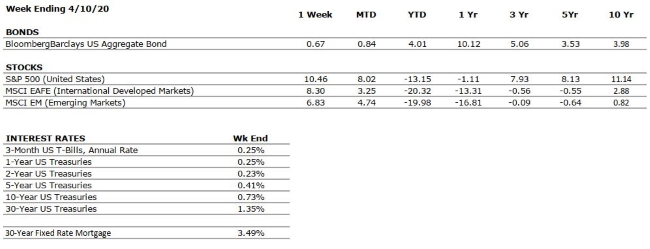by Connor Darrell CFA, Assistant Vice President – Head of Investments
In what might be a perfect example of why market timing is such a fallible investment strategy, the U.S. equity market generated its strongest weekly gain since 1974 last week. Investor sentiment has improved throughout much of the past couple of weeks as new data has started to show signs that the number of new cases of COVID-19 may be peaking. In the United States, the number of deaths projected by epidemiological models declined sharply last week as social distancing efforts have produced positive results.
Also aiding the market’s recovery has been the unprecedentedly robust response from the Federal Reserve, which announced additional measures last week to expand lending programs in an effort to provide a backstop for businesses, households, and municipalities impacted by the pandemic. As part of these new measures, the Fed announced it would support new debt issuance for corporations which have recently lost their investment grade credit ratings. Such companies, often referred to as “fallen angels” face significant increases in borrowing costs just as the need for cash has increased. Fed Chair Jerome Powell spoke on Thursday in conjunction with the announcement of the new policy initiatives and reiterated that there will be no limit to the aid that the Fed can provide markets, other than where it is prohibited by law.
Europe Struggling to Pass Fiscal Stimulus
All of the above continues to support much of what we have been communicating in recent weeks, which is that the economic impacts of the pandemic will be immense, but that the impact of swift and robust policy responses should not be discounted. These responses, however, are an important part of the puzzle when it comes to determining what the path forward will look like once we reach the other side. A coordinated and effective policy response will be essential for keeping the economy positioned for a recovery, and this creates potential problems for governments around the world which may still be struggling to find the consensus needed to legislate such a response. In Europe for example, economic crises tend to cause an elevated level of friction between the region’s more robust economies and those that are further behind in their development. Thus far, despite what economists around the globe identify as a dire situation, EU leaders have not been able to come to an agreement on a fiscal response to the crisis as a result of this friction. If the governments of the European Union are unable to reach such an agreement, the economic impacts of the virus could be substantially larger and longer lasting than what is seen here in the United States. And while we believe that the magnitude of the situation will eventually push leaders to find a solution, the ongoing discussions among EU leaders should be monitored closely.


